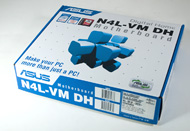Asus N4L-VM DH Core Duo Motherboard
Introduction
 Asus has been more cautious compared to most motherboard makers when it comes to using Intel's mobile processors in a desktop environment. In late 2004, when the first Pentium-M desktop motherboards started hitting the market, Asus took a back seat and did not put out a product for this rapidly expanding market, whereas smaller motherboard makers ate up this small amount of niche market sales. It's unlikely that this was due to any technical reason, as Asus has plenty of experience with the Pentium-M processor, as they produce dozens upon dozens of Pentium-M based notebooks. Rather, the timing wasn't right for them and the demand wasn't there.
Asus has been more cautious compared to most motherboard makers when it comes to using Intel's mobile processors in a desktop environment. In late 2004, when the first Pentium-M desktop motherboards started hitting the market, Asus took a back seat and did not put out a product for this rapidly expanding market, whereas smaller motherboard makers ate up this small amount of niche market sales. It's unlikely that this was due to any technical reason, as Asus has plenty of experience with the Pentium-M processor, as they produce dozens upon dozens of Pentium-M based notebooks. Rather, the timing wasn't right for them and the demand wasn't there.
Asus finally caved into peer pressure (Everyone's doing it!) and released their first Pentium-M desktop product nearly six months later, although not in the form of a full-fledged motherboard. Their first Pentium-M desktop product was the CT-479, which was an adapter card which allowed Pentium-M processors to be used in Socket-478 desktop motherboards. While quite an ingenious product, the timing of its release was unfortunate, as Intel platforms were in the middle of a migration towards Socket-775 CPU form factors and PCI Express graphics cards. Socket-478 sales had all but stopped at the time, and such, Socket-478 to Socket-479 adapters weren't popular either, despite the stellar performance of these cards in comparison to newer Pentium 4 solutions.
With the release of Intel's Core Duo, Asus is doing it right this time. They are one of the first with a full-fledged Core Duo desktop motherboard out on the market in the form of the N4L-VM DH. This platform is targeted directly at desktop users and gamers who want an ultra-low noise, low-power system, in addition to the rapidly expanding home theater PC market. As an added bonus, the N4L-VM is the least expensive Core Duo desktop platform to hit the market yet, finally cracking the sub-$200 barrier. Pentium-M/Core Duo desktop motherboards have been notoriously expensive compared to Athlon64/Pentium 4 based platforms, so hitting these lower price points certainly may help spur adoption of Core Duo on the desktop.






